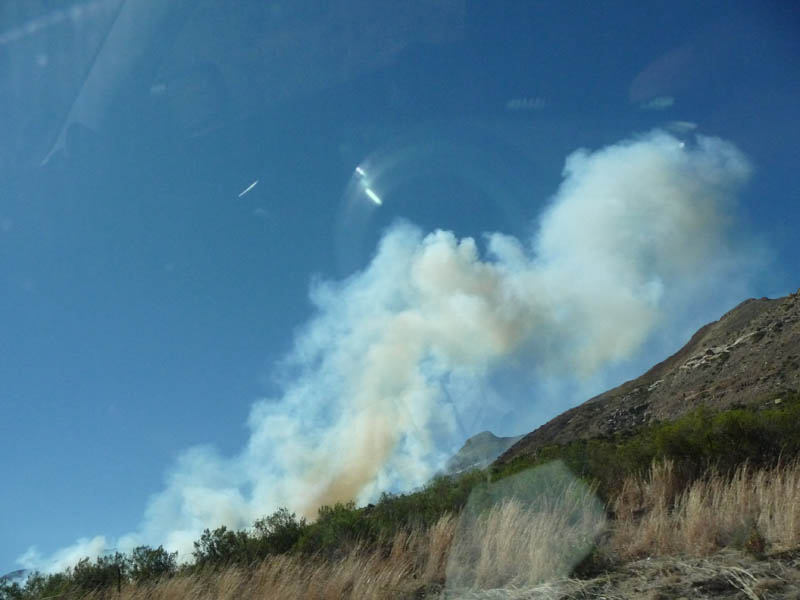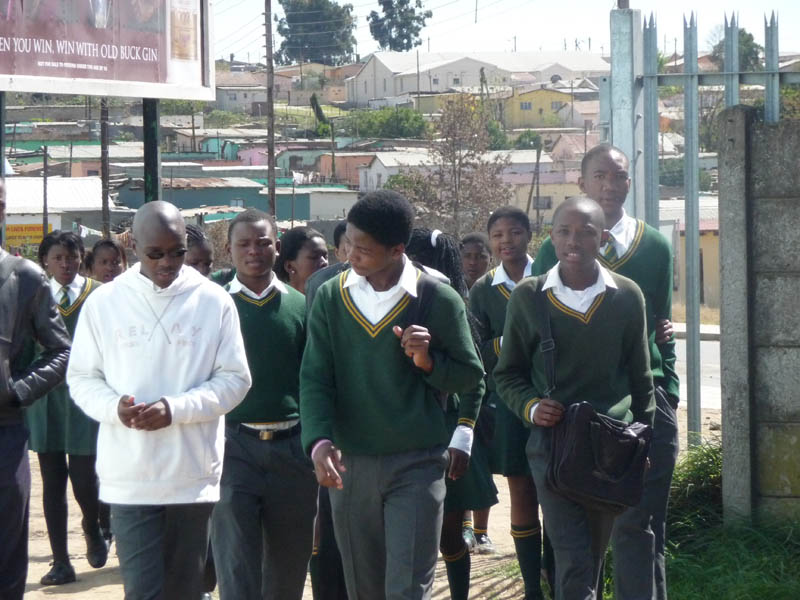Sept 23, 2008 – “This is not the freedom our leaders before us fought for. AIDS is killing us but we seem as if we don’t care. Let’s get together and fight this disease!”
A crowd of 400 people applauded these words from a young woman at the community conversation held in Mthatha on September 3.
About Mthatha
Mthatha is in the centre of the old Transkei region of the Eastern Cape. It falls under the King Sabata Dalindyebo Local Municipality and the OR Tambo District Municipality.
Nelson Mandela was born and grew up near Mthatha, in the villages of Mvezo and Qunu respectively.
The community conversation team that worked in Mthatha noticed that teenage pregnancy seems to be a major challenge here. Abortion services are widely advertised on the streets, indicating a demand. One of the young participants in the Conversation spoke of many teenagers going to back-street abortion clinics without their parents’ consent and paying R300 for a pill that induces abortion, which then happens at home with no supervision.
The high rate of teenage pregnancy suggests that the HIV infection rate may be high too.
Social mobilisation
The goal was to mobilise at least 400 people to attend the community conversation to discuss HIV accelerated prevention. The implementing team had only a week to do this, starting on August 18. They used the tactics of tapping into local events and meetings and addressing groups to deliver invitations, as well as targeting places where people gather, such as trading spots and clinic waiting rooms. The team also engaged various institutions, government offices and businesses working in Umtata. Loud-hailing was used in several wards to inform residents about the conversation.
Partnerships
The following were engaged as partners:
- Councillor for Ward 3, King Sabata Dalindyebo (KSD) Local Municipality
- Speaker’s Office
- Office of the Premier
- KSD Youth Advisory Centre
- KSD Municipality Special Programme
- Municipal Communications Officer
- OR Tambo District Municipality
The municipalities contributed food and working space, loveLife helped put up posters and local businesses contributed food and drink.
Media
Tru FM, the only radio station that targets primarily young people and broadcasts in English and Xhosa in the Eastern Cape, flighted an interview about the conversation throughout the day on September 3. Posters were distributed in strategic places such as taxi ranks, shops, taverns and youth centres.
Conversation session
On November 24, 2007, the Nelson Mandela Foundation held a youth community dialogue at St Paul’s Catholic Church in Mthatha to talk about HIV prevention and related issues. A disappointing crowd of only 90 youth aged between 16 and 24 attended that conversation. Among the concerns that became apparent in the discussion were the high prevalence of women and child abuse and the prevalence of the myth that sex with a virgin cures AIDS. It was obvious that adults, inhibited by rigid cultural stereotypes, rarely talked to their children about sex.
This year there was a great need to get both older and younger generations together under one roof.
On September 3, 400 community members attended the conversation at the Rotary Club Hall in Ngangelizwe township, Mthatha. Of these, 33% were male youth, 35% were female youth, 8% adult men and 25% adult women.
Facilitators trained in the Community Capacity Enhancement methodology guided the participants through the steps in the conversation: establishing ground rules, storytelling, counting your losses, and electing an action committee.
Storytelling
The same story outline was used as had been used in other community conversations in this year’s series, namely that of two religious families, in this case named Dlamini and Maphungubwe, who are about to be linked by a marriage when the bride, a university student, finds that she is HIV-positive. This time, the young woman’s name was Nomahlubi and her teacher fiancé’s Thamsanqa.
Asked what they would feel and do if they were Nomahlubi, some people responded as follows:
- “I would inform Thamsanqa and take it further from there.”
- “They have to be honest with one another; the truth is they were unfaithful to each other.”
- “Nomahlubi is in denial; they had unprotected sex.”
- “I would inform my family and they would invite him over to talk so he can also be informed of this.”
If they were Thamsanqa:
- “I trust her, even though I will not know if she wasn’t faithful, I would stay with her. She would have probably cheated. I would talk to her and proceed with the wedding.”
- “If we had never tested, we would have gone ahead with the wedding, so let’s accept it and go ahead with the wedding.”
- “Go for counselling together with my partner. Encourage her to check her CD4 count and viral load so that we can see if she can still have children. Then we would join support groups together and try to conceive a baby.”
If they were Nomahlubi/Thamsanqa’s family:
- “I would wait for their decision. I would advise her and accept her as she is and not make her feel bad.”
- “I would discuss this issue with my wife and we would try and encourage them. She is no different from other people and we will always love her as her parents.”
- “She’s my child, she did nothing wrong. Anyone can get infected and it can happen in many ways. I would tell her that she still has a long life ahead of her.”
If they were members of the community:
- “People have lost their lives because we don’t disclose. Stakeholders, NGOs and the community must come together and talk about the disease and mindsets. We must speak openly about HIV/AIDS. Five family members died the other day because of stigma. A mother disclosed to someone she trusted and they went around spreading rumours about her, so she decided it was better for her to kill her four children and then kill herself than to face the humiliation.” (The speaker was referring to an actual incident that had taken place recently in Mthatha.)
- “This is not the freedom our leaders before us fought for. AIDS is killing us but we seem as if we don’t care. Let’s get together and fight this disease!”
- “We say we must love them. Praise the Lord. You don’t stop loving your child when he or she gets infected. You have to love your child as they grow up and protect them.”
Counting your losses
This process, where the people at the conversation place small stones on a cloth to represent people who have lost their lives, often revives painful memories but can be the first step towards healing and change. These were some of the comments people made afterwards:
- “I laid down four stones there; one was my brother’s son. My heart was broken. Second was my sister who did not disclose. Third was my cousin, and fourth was for all those I loved and cared for, even those I didn’t know who died of HIV.”
- “I placed one stone that represented my niece who used to live with me in my house. She spoke too late when she was already critically ill and she died.”
- “My aunt died when I was very young. She didn’t know she was HIV-positive. On the day of her funeral it was said that she had died of asthma. I used to take care of her every day when I returned from school but she died. I miss her a lot.”
- “I’m reminded of my aunt who died of HIV/AIDS. My uncle used to work in Johannesburg; when he returned he did not go back to his home to live with his family, he came to live with my mother at my grandmother’s home and he didn’t disclose. He claimed to have been poisoned by my mother. On his death bed, he asked to see my mother, but she refused to go and see him, she was too pained. He then wrote a letter saying that he had AIDS and that it wasn’t my mother who made him sick like he said. His wife died a few weeks later. His children could not cope with this and wanted to find someone to blame, so the family was torn apart. But now they come to visit and talk to us, so things will get better.”
- “When I went to the front there, I put down four stones representing my daughter, my sister, my cousin and the neighbours who helped me through difficult times. At last I can afford to bury them after going in and out of clinics and social workers’ offices.”
Issues raised
The strongest concerns raised by the community were stigma and lack of support from families and community members.
Challenges and successes
The venue was too small to accommodate the many community members, including school groups, who attended. Some people had to stand and crowd control is always an issue when there are large numbers of young people present. However, having an experienced facilitator brought calm to the event.
Radio coverage was limited because some local stations insisted on payment for airtime.
However, the local municipality got involved enthusiastically, encouraged the attendance of important stakeholders, offered the venue and provided lunch.
Action committee
The community elected a committee representing the various demographic groups. The day after the conversation, the committee met to discuss what they needed to do and learn more about the conversation methodology. The committee was informed that they would receive training from the Nelson Mandela Foundation so that they could hold further conversations.
Only two invited stakeholders were present: a health worker and a ward committee member. It was agreed that the committee needed to identify more stakeholders (for example, in the Health and Education departments and the municipality) and introduce themselves and explain their responsibilities. The health worker committed to supporting the committee in the interim.






